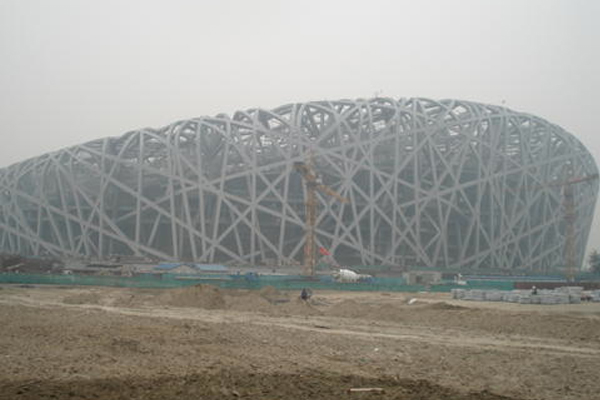Breathing in Beijing: Pollution A Problem for Olympians
呼吸北京空气:奥运选手受到空气污染的困扰
Athletes, coaches, and officials are all talking about Beijing's dirty air
奥运会期间,北京的空气污染引起了包括运动员、教练和官员等各方的普遍关注。
by Laura Dilley
Date Published: 11/09/2007

The Bird's Nest Stadium, home of the Olympic's opening and closing ceremonies and track and field events, under construction in July 2007. Photo by Nancy Chen.
If you ask Bryshon Nellum how it feels to run in Beijing in August, his answer probably will not shock you.
“The air was heavy, and it was hard to breathe,” Nellum said. “The air was thick like a fog, and I could barely see 50 feet in front of me.” The world-class sprinter said he could see and feel the difference in air quality almost immediately after arriving last year for the World Junior Track and Field Championships, seen as a trial run for the Olympics.
Environmental quality in Beijing is a major concern among athletes and coaches who are considering competing in the Olympics there next year. Nellum feels that the Chinese government did nothing to control the pollution during the Junior World Games and has little optimism that things will be better next summer.
“I give them a fifty-fifty chance,” Nellum said. “The government can try, but they can only do so much when the pollution is that bad.”
The air quality, in fact, is so worrisome for athletes that the American, Australian and British sports federations have decided to house some of their athletes away from Beijing until they compete, reducing air exposure.
Ron Allice, the director of the track and field program at the University of Southern California, has a different view of the situation. While he believes that pollution is a legitimate concern, he also believes that China will be able to resolve the issue in time for the Olympics.
“Any country that puts on the Olympic Games does it to showcase their country to the world,” Allice said. “They have been preparing for this for years and years. They can’t afford to mess it up.”
Indeed, China has been preparing for this event even before they were awarded the 2008 Games in 2001. China set a 10-year goal in 1998 to see environmental improvement by 2008 in the hope of bolstering their bid candidacy. And, according to Wang Wei, Executive Vice President and Secretary General of the Beijing Olympic Committee for the Olympic Games (BOCOG), the government has made great strides in its attempts to tackle the issue of air quality.
Wang said on the BOCOG website he wants to ensure that all Olympians “enjoy a comfortable environment during their stay in Beijing.”
In one attempt to curb pollution, Beijing conducted a four-day air quality experiment this past August. The city government ordered a pre-Olympic tests where about 1.3 million vehicles, nearly half the city’s total of three million, were to stay off the road each day based on their license plate numbers. The air quality was classified as "fairly good" for the next three days as a result of an estimated five million fewer car trips than normal.
Though the smog-filled haze still hung over the city during the experimental period, the Beijing Environmental Protection Bureau said it was satisfied with the results.
“The test provided us some reference and experience in perfecting our Olympic air quality assurance program, and also gave us some experience in helping Beijing continue to improve the quality of the atmospheric environment,” said Wang Xiaoming, the Chief Information Officer of the Bureau, in a phone interview.
 |
|
Bryshon Nellum competed at the Junior Track and Field Championships, a test bed for the 2008 Olympics, in Beijing last year.
|
According to the WorldWatch Institute, Beijing experienced 241 “blue sky” days with good air quality in 2006. Still, much work remains in the struggle for clean air. Liu Qi, the president of BOCOG and Beijing party leader said in a BOCOG press release that improvement is still necessary in environmental and traffic problems, classifying them as interrelated.
“People need to seriously sum up and analyze the results of the ongoing action in an effort to find out solutions to traffic jams,” Liu said. “Beijing needs to improve its preparatory work for the Olympic Games and upgrade the management levels of urban affairs to achieve mutual promotion and a virtuous cycle between urban development and Olympic preparations.”
Government officials in China are not alone in their thoughts and efforts to improve Beijing in time for the 2008 Games. Those in the athletic field are performing experiments in an effort to fight the problem as well.
David Martin, an exercise physiologist with USA Track & Field, tested the use of surgical masks during the Championships in the hope that they would allow athletes to breathe naturally while keeping out toxic pollutants. Unfortunately, the mask did not allow athletes to take in the amount of oxygen they needed.
“When you breathe polluted air, you feel the effects,” Martin said in a phone interview. “There isn’t much you can do to remove the effects of noxious chemicals."
Martin believes it is up to Beijing to fix its problems.
"The Games were awarded to Beijing on the condition that they would provide adequate preparations to hold them," Martin wrote in a subsequent e-mail interview. "The pollution issue is therefore THEIR responsibility to manage adequately."
China must prove not only that it has earned to right to host the Olympics, but also that it can put on a fantastic show. Failures, such as a large number of athletes collapsing or suffering from breathing problems because of Beijing’s pollution, have the potential to escalate into a disaster for the athletes, the Games and also China.
“A country has never failed to provide for the Olympic Games,” Martin said. “It would be an embarrassment if China failed.”
Beijing’s pollution has already created a public relations fiasco for the Olympic Committee. During a visit to China in August, Jacque Rogge, the president of International Olympic Committee, suggested changing event dates and locations during the Games if pollution remains a problem.
The remaining dilemma is whether or not Beijing will be able to mitigate its environmental problems in time for the opening ceremonies next year, a problem constantly plaguing host cities.
More than 20 percent of American athletes had breathing difficulties because of the smog during the Athens Olympics in 2004, Randy Wilber said in an interview with Der Spiegel, the German newsmagazine. Mexico City and Los Angeles, which hosted the Olympics in 1968 and 1984, respectively, also had problems with air pollution.
There have, however, been success stories as well.
When Seoul hosted the Olympic Games in 1988, air quality was also a major issue. The government attempted to improve the environment by shutting down all factories and businesses. It also controlled the amount of electricity and power usage in Seoul households, starting three weeks before the Games started. The regulations and inconveniences worked well for the environment with reports of cool clean air and no health problems for the athletes.
China needs to do more than simply hope for the same results, Martin said.
“The Olympics is one of the greatest events in mankind,” he said. “There is no alternative for China. They must solve the pollution problem because they cannot afford to fail.”
Laura Dilley is pursuing a Masters degree in International Public Policy and Management in the University of Southern California's School of Policy, Planning and Development.
|
"While we appreciate the long hours and the effort that our Chinese counterparts have put into those trade discussions, quite frankly, in the grand scheme of a $300- to $500-billion trade deficit, the things that have been achieved thus far are pretty small. I mean, they're not small if you're a company, maybe, that has seen some relief. But in terms of really getting at some of the fundamental elements behind why this imbalance exists, there's still a lot more work to do."
- Rex Tillerson, US Secretary of State, at a press conference during Pres. Trump's visit to Beijing, Nov. 9, 2017
|